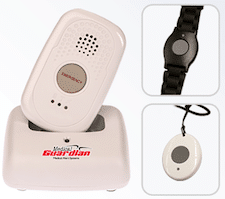GPS integration is one of the newest and most significant advances in medical alert technology. By simply carrying a small mobile device while out and about, America’s seniors can now have the same peace of mind outside the home as they do within it. Not only does this enable your loved ones to remain in contact with the medical monitoring service wherever they may be, it also leaves you safe in the knowledge that they can be located with the click of a button. Studies have shown that 18% of American seniors live alone and 43% have regular feelings of loneliness. However, this doesn’t need to be the case, with GPS giving seniors more confidence to leave the home and spend time visiting friends and engaging with society. Free from the worry of potential dangers, mom and dad will be able to enjoy the freedom and independence they deserve.

With 40% of fall related injuries happening outside of the home, a medical alert system with GPS allows for more comprehensive coverage than a traditional plan. A mobile device essentially performs the same function as a home base station and traditional emergency buttons, meaning the user can push the help button in the event of an emergency and enter into two-way dialog with a trained professional. The added benefit of GPS makes it even easier for help from the emergency services to get to exactly where your loved one is as quickly and efficiently as possible should it be needed. This is made possible by Global Position System technology, which allows the exact positioning of the device to be visible on a computer screen back at the monitoring center.
While other medical alert systems can be dependent on the user having a landline, GPS systems are completely cellular making them available to almost all homes. This means that travel and vacations are not out of the question, with coverage available throughout the US. A further advantage offered by some providers is the ability to keep an eye on your loved one yourself via your cell phone without them feeling any loss of their independence.

As stated earlier nearly half of falls in elderly happen outside of the home, making a medical alert system with GPS and fall detection technology the best possible combination to ensure that help is there as quickly as possible in case of an emergency. A medical alert button that has an auto alert sensor built-in will automatically trigger an alarm in the monitoring center when the senior falls, which is an indispensable feature when a senior is unable to push the emergency button in case of such an event. Fall detection is one of the latest innovations in medical monitoring, and is often combined in the latest mobile medical alert systems along with GPS and cellular technology.
Medical Guardian’s mobile alert system comprises a rechargeable GPS integrated mobile monitoring unit and a waterproof alert transmitter, which is available as both a necklace and wristband. Using the mobile monitoring unit, the company’s 24/7 emergency response center is contactable from both within and outside of the home simply by pressing the button on the device, enabling two-way communication between your loved one and a trained operating professional, who will have access to several approved contacts in case of emergency, such as friends, family and neighbors. The GPS enables the user to be tracked and easily located if help is required.
This coverage is available for a set price of $39.99 per month, which is guaranteed to never rise after purchase. The mobile monitoring unit and alert transmitter are included as a part of this package for no cost. Medical Guardian guarantees no long-term contracts and no activation fee. Full Medical Guardian review…
This system includes a mobile device, a cradle charger and one of a wrist button or neck pendant. Its wireless cellular technology is provided by AT&T, which covers 97% of inhabited areas in the US. The lightweight mobile unit enables the wearer to contact the company’s emergency response operators and allows for two-way conversation. Using the GPS, an operator is able to get help from the closest emergency responders to the user’s current position.
Medical Care Alert offers three separate Home & Away packages based on different payment schemes. The cheapest of these comes at an annual cost of $439.45, and includes free shipping and one month of free coverage, giving an overall monthly cost of $36.62. Both the quarterly and bi-annual packages work out at $39.95 per month. All packages come with a risk-free 30-day trail and free partner coverage.
Mobile Help provides both a mobile device and a fixed base station, offering traditional in-home monitoring on a cellular network. The package also includes a cradle charger and an emergency button in necklace or bracelet from. By pressing their mobile device’s help button, your loved one instantly provides their pinpoint location and unique ID to the company’s call center, which has access to a selection of provided emergency contacts on file and either they or the nearest paramedics will be called if required.
Mobile Help’s cheapest plan costs $443.40 annually, working out at $36.95 per month. The quarterly plan works out at a slightly more expensive $39.95 per month, and the monthly plan requires payments of $41.95. All of these packages come with free activation and a 30-day risk free trial. A fall button is available for an extra $10 per month.
The Best Reviews team researches and tests all products first-hand. We've been reviewing products and services since 2012 and are proud to only publish human-created content.
Share your thoughts, ask questions, and connect with other users. Your feedback helps our community make better decisions.
©2012-2025 Best Reviews, a clovio brand –
All rights
reserved